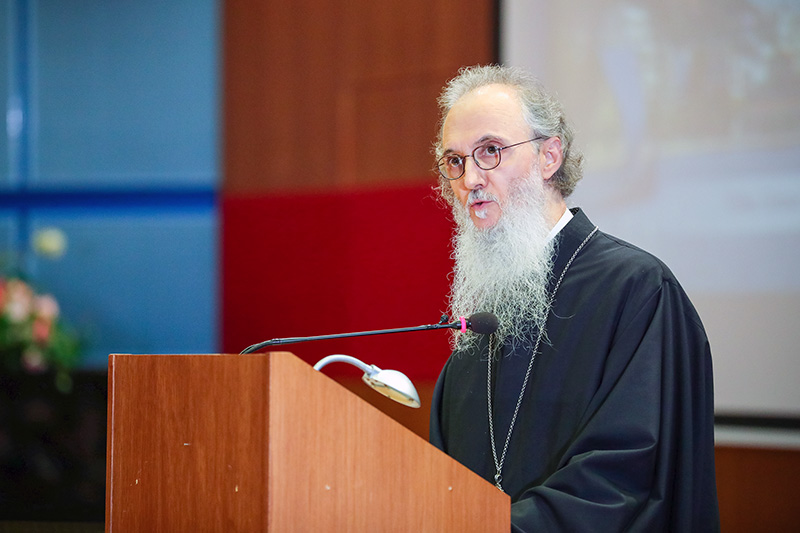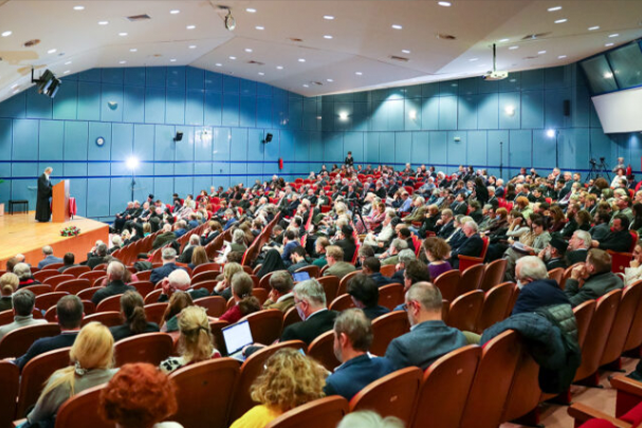(RNS) — Nearly 400 Orthodox Christian theologians from 44 countries convened in the largest international conference of its kind in Greece on Thursday (Jan. 12) to discuss “Nicaea-sized” questions facing the Eastern Orthodox Church amid war and bitter division.
Some of the most contentious issues at the Mega-Conference of the International Orthodox Theological Association, meeting in Volos, have been exposed by Russia’s invasion of Ukraine in February, which exacerbated a split between a newly independent Orthodox Church of Ukraine in Kyiv and the Russian Orthodox Church based in Moscow.
The conference’s keynote speaker, Metropolitan Ambrosios (Zografos) of Korea and Exarch of Japan, a bishop of the Ecumenical Patriarch of Constantinople, told the assembly Wednesday evening that the various branches of Orthodox Christianity had fomented a heresy by taking sides in the war, calling it “an unspeakable travesty” that as a result, “most Orthodox leaders have failed to condemn this diabolical war unequivocally.
“We cannot even say, ‘Well this is a war driven by politicians. Our churches are against it,’” Ambrosios said, “because so few of our church leaders have actually taken a public anti-war stance.”
At the root of the Russia-Ukraine split is a theological heresy called ethno-phyletism that conflates church and nation, Ambrosios argued. The practice of applying church governance based on ethnicity, nationality or culture rather than geography, the metropolitan said, is “nothing less than the greatest danger to the Orthodox unity of the church.”
The effects of ethno-phyletism often lead to church members excluding Christians who don’t match their particular ethnic identity, however subtly, or to elevating nationality over faith.
The debate over the ideology has led to finger-pointing: Critics of the Moscow Patriarchate point out the Russian church has expanded into jurisdictions, such as Africa, where they had no canonical authority. Critics of the Patriarchate of Constantinople point out, on the other hand, that in 1922 the Greek Patriarch established Greek Orthodox Churches in the U.S., rivaling the Russian church’s presence. Russian-led organization of the Orthodox churches in the U.S. shifted after the Russian Revolution and amid waves of immigrants from Eastern Europe who requested priests from abroad to serve them.
Some argue completely eliminating ethno-phyletism would mean consolidating the independent Orthodox churches in the U.S., such as the Greek, Serbian, Antiochian, Russian and others that currently overlap their jurisdictions, into one Orthodox Church for the region.

Metropolitan Ambrosios (Zografos) speaks during the Mega-Conference of the International Orthodox Theological Association meeting in Volos, Greece, Thursday, Jan. 12, 2023. Photo courtesy of IOTA
Ambrosios’ diagnosis broadly echoes a contingent of Orthodox scholars and clergy who oppose Russia’s invasion of Ukraine that includes the event’s sponsors, the International Orthodox Theological Association, the Orthodox Theological Studies Association and the Volos Academy for Theological Studies. The scholars represent some 28 areas of study, including women in the church, asceticism, science and theology, political theology and more, all under a theme of mission and the Orthodox Church. Members of the Moscow Patriarchate attended, too.
“The Mega Conference of the International Orthodox Theological Association has become a most, if not the most, significant gathering of Orthodox Christian scholars from throughout the world,” said the Rev. Anton Vrame, a member of the IOTA board and a professor of religious education at Holy Cross Greek Orthodox School of Theology in Brookline, Massachusetts. “The spirit of the conference is joyous, with a strong sense of unity among the diverse membership.”
IOTA held its first conference in Romania in 2019. Fostering collaboration among Orthodox, Catholic and Protestant scholars, the conference aims to help church leaders continue Orthodox traditions in modern contexts, said IOTA President Paul L. Gavrilyuk. He listed religious fundamentalism, climate change, the pandemic, economic uncertainties and the war in Ukraine as pressures on the church to respond to world affairs, “for the sake of serving Christ and the church.”
Pantelis Kalaitzidis, director of Volos Academy, told the audience that the mission of the church cannot be only a theoretical or historical concern but must also be a contemporary one, since “God’s revelation takes place in history.”

